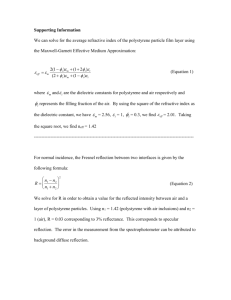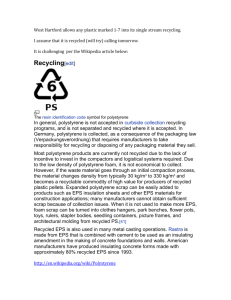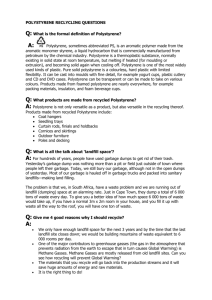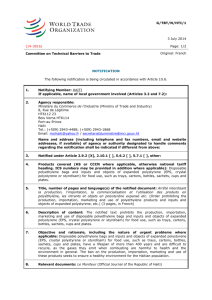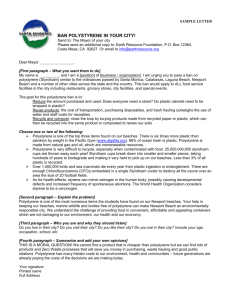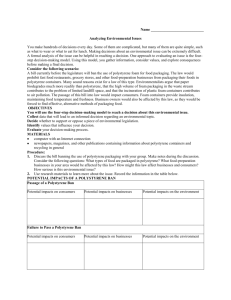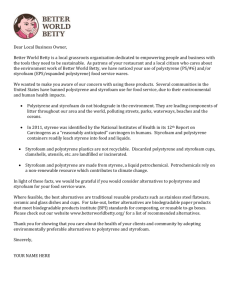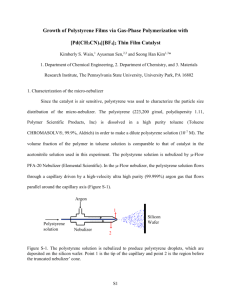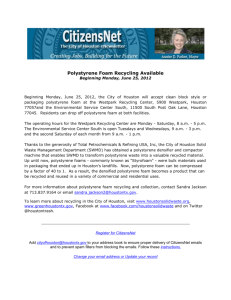RecyclingQ&A - Polystyrene Packaging Council
advertisement
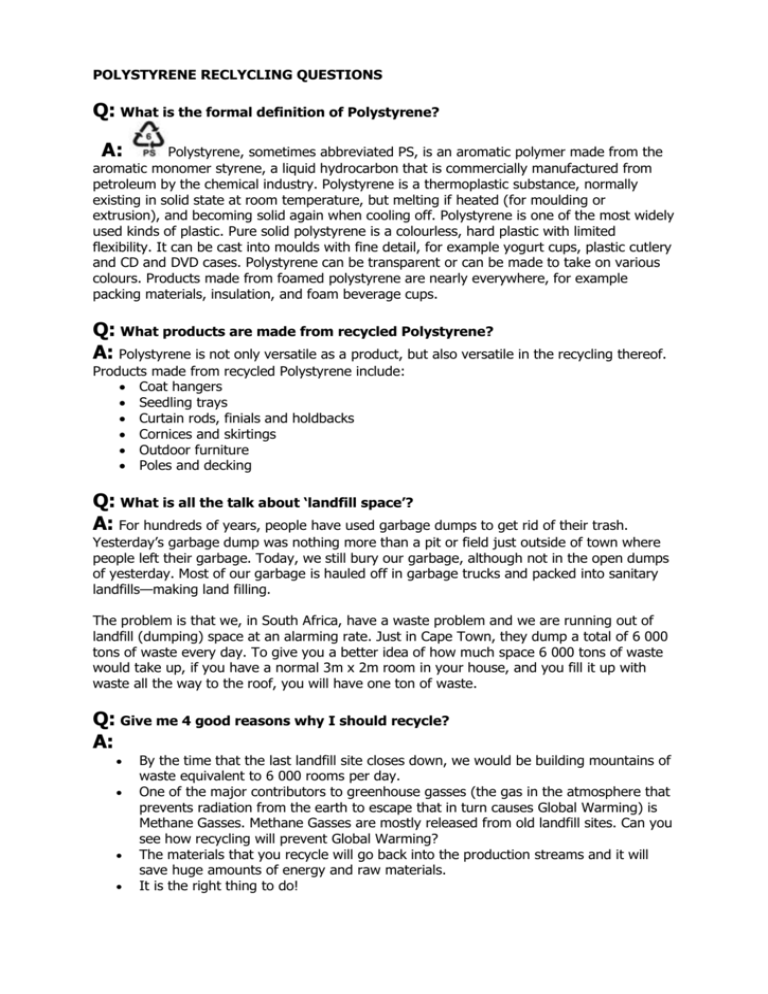
POLYSTYRENE RECLYCLING QUESTIONS Q: What is the formal definition of Polystyrene? A: Polystyrene, sometimes abbreviated PS, is an aromatic polymer made from the aromatic monomer styrene, a liquid hydrocarbon that is commercially manufactured from petroleum by the chemical industry. Polystyrene is a thermoplastic substance, normally existing in solid state at room temperature, but melting if heated (for moulding or extrusion), and becoming solid again when cooling off. Polystyrene is one of the most widely used kinds of plastic. Pure solid polystyrene is a colourless, hard plastic with limited flexibility. It can be cast into moulds with fine detail, for example yogurt cups, plastic cutlery and CD and DVD cases. Polystyrene can be transparent or can be made to take on various colours. Products made from foamed polystyrene are nearly everywhere, for example packing materials, insulation, and foam beverage cups. Q: What products are made from recycled Polystyrene? A: Polystyrene is not only versatile as a product, but also versatile in the recycling thereof. Products made from recycled Polystyrene include: Coat hangers Seedling trays Curtain rods, finials and holdbacks Cornices and skirtings Outdoor furniture Poles and decking Q: What is all the talk about ‘landfill space’? A: For hundreds of years, people have used garbage dumps to get rid of their trash. Yesterday’s garbage dump was nothing more than a pit or field just outside of town where people left their garbage. Today, we still bury our garbage, although not in the open dumps of yesterday. Most of our garbage is hauled off in garbage trucks and packed into sanitary landfills—making land filling. The problem is that we, in South Africa, have a waste problem and we are running out of landfill (dumping) space at an alarming rate. Just in Cape Town, they dump a total of 6 000 tons of waste every day. To give you a better idea of how much space 6 000 tons of waste would take up, if you have a normal 3m x 2m room in your house, and you fill it up with waste all the way to the roof, you will have one ton of waste. Q: Give me 4 good reasons why I should recycle? A: By the time that the last landfill site closes down, we would be building mountains of waste equivalent to 6 000 rooms per day. One of the major contributors to greenhouse gasses (the gas in the atmosphere that prevents radiation from the earth to escape that in turn causes Global Warming) is Methane Gasses. Methane Gasses are mostly released from old landfill sites. Can you see how recycling will prevent Global Warming? The materials that you recycle will go back into the production streams and it will save huge amounts of energy and raw materials. It is the right thing to do! Q: 5 Tips to recycle at home A: 1. Keep it simple: Make space next to your bin for a recycling container – then it’s as simple to recycle as it is to throw it away 2. Make life easy: If there’s a kerbside recycling scheme running in your area, take advantage and use it. To find out more, contact the Polystyrene Packaging Council to find out more. 3. Routine recycling: Make a visit to your closets recycling drop-off site part of your routine. Contact the Polystyrene Packaging Council for a full list. 4. Remember to check for the number ‘6’: You might not think that an item is made from Polystyrene and therefore recyclable, but double-check for the number ‘6’ and add it to your recyclable items. That includes CD cases and yogurt cups. 5. Check other rooms in your home: Don’t just recycle items from your kitchen. Remember the other rooms in your house too! Q: Did you know? A: Polystyrene can be recycled up to 20 times without any damage to its physical properties. Last year we recycled 850 tons of polystyrene. It is equivalent to 30 storeys of a rugby stadium such as Loftus. Only about five percent (5%) of foam packaging is Polystyrene, the rest is air! Your computer’s outer housing is made from Polystyrene! Polystyrene food packaging uses less energy and resources to manufacture than comparable paper or coated paperboard products. Q: How do I contact the Polystyrene Packaging Council? A: Visit our website at www.polystyrenepackaging.co.za or send an email to info@polystyrenepackaging.co.za or call us at 012 259 0554.
